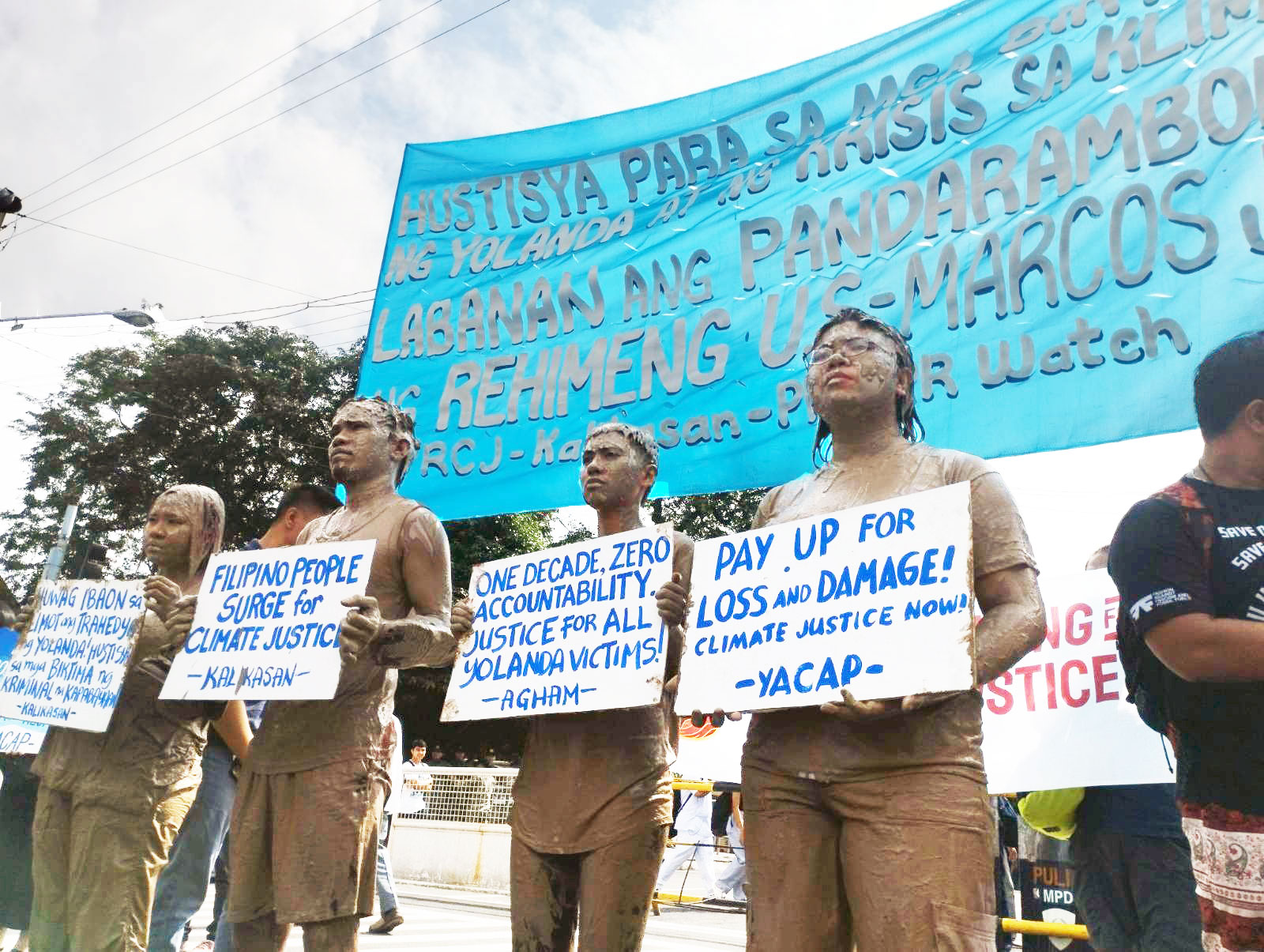On the 10th anniversary of super typhoon Haiyan in the Philippines, we stand in solidarity with the millions of victims of its devastation who continue to struggle to rebuild their lives a decade since the disaster. We are one with each victim of climate-related disasters in their demand for climate justice and rehabilitation. Governments and relevant institutions must take real and lasting climate action to protect the people, especially the rural poor who are most vulnerable.
On November 8, 2013, Typhoon Haiyan struck Central Philippines and became one of the deadliest typhoons ever recorded. The category five typhoon, locally known as “Super Typhoon Yolanda,” with sustained winds of 275 km/h and created a deadly storm surge estimated at 24.6 feet, affected at least 16 million individuals and left 6,300 people dead. It displaced at least four million people, notably poor coastal communities and fisherfolk who were forced to relocate and leave their livelihood. The super typhoon destroyed 600,000 hectares of farmland and caused an estimated USD 70 million in damages in the Philippines. Worse, some Haiyan survivors are still without a new home, with many opting out of relocation sites assigned by the government due to a lack of access to livelihoods and essential services like water. The Philippines ranked fourth worldwide among countries most affected by severe weather events in the past two decades.
Many scientific studies have established the compelling link between stronger typhoons and anthropogenic climate change, which increased sea surface temperatures and subsurface sea temperatures. As noted in the study “Integrating Disaster Science and Management: Global Case Studies in Mitigation and Recovery,“ when the ocean’s surface and deeper layers get hotter, it takes away the usual cooling effect that helps weaken typhoons. Cold water from below usually tames their strength, but higher sea temperatures threaten that natural balance. Stronger typhoons are also aggravated by rising sea levels.
The UN Intergovernmental Panel on Climate Change (IPCC) listed Haiyan as one of the extreme events linked to ocean and cryosphere changes due to climate change. It attributed the super typhoon to the ocean heat content and sea levels that have increased since 1998.
A decade since Haiyan, climate-related disasters (e.g. severe floodings, rising sea levels, droughts, and heatwaves) continue to batter the world, with the worst impacts observed in the most vulnerable and poor countries where people suffer from the incalculable loss of lives and billions of dollars in losses of livelihood, homes, and infrastructures.
Rural peoples are most affected as typhoons and record-breaking floods destroy farmlands and crops. Farmers, without substantial government intervention and sustainable programs, are struggling to adapt to the crisis and are pushed to further poverty and hunger. For instance, Filipino farmers, fishers, and their families affected by Haiyan reported increasing difficulties making ends meet, including securing basic necessities such as food, several years after the super typhoon hit due to lack of government support.
Transnational corporations (TNCs), mostly from the wealthiest industrialized countries, and their reckless plunder of the planet’s resources for profits are directly causing the climate crisis and are thus also responsible for the continuing injustice against Haiyan survivors. Their destructive corporate plunder is powered by the USD 6.6-trillion fossil fuel industry, which by itself is responsible for over 75% of global greenhouse gas (GHG) emissions and nearly 90% of all carbon dioxide emissions. As we near the 28th session of the Conference of the Parties (COP28) to the UN Framework Convention on Climate Change (UNFCCC), the lack of justice for Haiyan victims reminds the world of the urgency of ambitious and firm commitments to real climate action and meaningful steps towards the realization of climate justice. This includes a just and equitable transition away from fossil fuels, actual reductions in GHG emissions, and just compensation to the Global South for loss and damage. Rich countries, which comprise just 12% of the global population but account for 50% of GHG emissions over the past 170 years, must be held most accountable.
Radical food systems transformation plays a key role in the path towards climate justice. Through the Global Peoples’ Caravan for Food, Land, and Climate Justice (GPC), we are mobilizing communities for people-led pathways to just, equitable, healthy and sustainable futures. The GPC reiterates its demands to COP28 negotiators. To address the climate crisis, governments must: (1) Transform food and agricultural systems away from fossil fuels towards agroecology and food sovereignty; (2) End corporate monopoly over agricultural lands, waters, and other natural resources that plunder the planet and cause the climate crisis; (3) Make rich countries and giant corporations pay for the losses and damages caused by their climate destruction; (4) Condemn and stop wars of aggression and militarization that worsen global hunger, displacements, and the climate crisis; and (5) Ensure genuine participation of rural peoples in climate policy and decision-making at all levels.
Justice for Haiyan survivors and all victims of climate disasters!








Discussion about this post